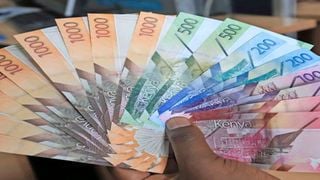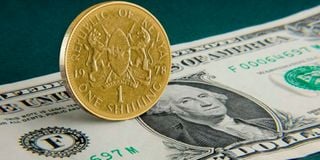
Kenyan currency notes of different denominations.
| File | Nation Media GroupBusiness
Premium
Here is why shilling is rallying against the dollar
What you need to know:
- Some commercial banks sold the shilling for as low as Sh139 for the US dollar on Thursday morning, compared to Wednesday’s average of Sh153.75, reflecting the volatility that crept into the market as a result of having many sellers and few buyers of the greenback.
- The Treasury estimates that a movement of the exchange rate by one unit impacts debt service costs by Sh40 billion.
A combination of Central Bank of Kenya (CBK) intervention, inflows by foreign buyers of the infrastructure bond and rising investor confidence has served to generate a sharp reversal of the shilling’s depreciation in recent days, a rare event that has been helped along by hoarders of US dollars dumping their stash in panic trades.
Some commercial banks sold the shilling for as low as Sh139 for the US dollar on Thursday morning, compared to Wednesday’s average of Sh153.75, reflecting the volatility that crept into the market as a result of having many sellers and few buyers of the greenback.
The spot rate in the interbank market stood at Sh146 to the dollar, representing a 4.7 percent drop on the CBK’s official closing rate of Sh153.20 per dollar on Thursday.
This, according to forex traders, forced the CBK to intervene by buying dollars to stop the shilling from racing lower too quickly. The CBK normally steps into the market to iron out volatility with dollar purchases when the shilling is gaining too quickly on the dollar, and to sell dollars when the opposite happens.
Earlier in the week, the regulator had injected some dollars into the market, a dealer said, while routine sales by exporters on Wednesday —mainly the Kenya Tea Development Agency (KTDA)—also raised the supply of dollars leading to the sharp appreciation of the shilling over the two days.
“Those holding dollars, either for speculative purposes or to hedge against future shortage or price increase were selling off in order to avoid suffering exchange losses on their holdings,” said the commercial bank dealer.
“The CBK stepped in on Thursday to buy dollars from the market to reduce volatility. Over the last two days, we have not seen many dollar buyers, with some telling us that they are holding out for the rate to go down further. Meanwhile, the number of those looking to sell has gone up.”
Dollar inflows were also boosted by foreign portfolio investors who were participating in the February infrastructure bond, whose auction closed on Wednesday raising Sh240.96 billion against a target of Sh70 billion.
Last week, the CBK had said that the bond was attracting significant interest from foreign investors, who were drawn by the potential of locking in a high interest return before global rates start to moderate in tandem with the upcoming cuts in the US Federal Reserve rate.
“There are several factors driving the shilling’s appreciation. The infrastructure bond brought in significant US dollar inflows, and we have also seen those who were hoarding US dollars release them,” a bank CEO said.
Local market signals around the country’s successful raise of $1.5 billion (Sh230 billion) have also boosted the shilling, mainly because of the reassurance that the Treasury will not dip into the CBK’s forex reserves to raise funds to retire the $2 billion 2014 Eurobond that matures in June.
Before the government announced its new bond sale, whose proceeds are being used to buy back or retire a portion of the 2014 bond, there was uncertainty about its ability to repay the maturing paper.

The Kenyan shilling posted its strongest intra-day gain against the US dollar in 12 years on February 14.
The buyback was done via a tender system where investors would indicate their willingness to retire their holdings early and be paid their principal in full, together with all interest accrued since December.
The buyback closed on February 14, with the Treasury expected to release the results by Thursday evening. Following the issuance of the Eurobond, the government set a cap of $1.4 billion for the buyback.
Paying the entire bond from reserves would have meant a serious hit on the CBK’s ability to defend the shilling, which the regulator had already identified as having weakened beyond its true level against the dollar.
The Eurobond has therefore removed a major stumbling block for the shilling and forced a rethink by dollar holders who were hedging on difficulties in repaying the bond.
“A lot of people were betting on Kenya not being able to pay the Eurobond which would have meant a devaluation of the shilling. Those who had made bets on this happening have now taken them back and there is no need to hold dollars anymore,” said EGM Securities research and markets analyst Rufas Kamau.
“Forex markets tend to overreact to both bad and good news.”
The effect of the gain the shilling has made against the dollar —should it hold— is set to reflect strongly on the government’s stock and servicing costs of external debt.
The Treasury estimates that a movement of the exchange rate by one unit impacts debt service costs by Sh40 billion.
For the private sector, importers are set to benefit from a lower cost of goods shipped in from abroad, potentially giving the final consumer a reprieve from the high imported inflation on basic goods.
For exporters however, the stronger shilling results in lower earnings from overseas sales, potentially widening the country’s trade deficit if imports go up at the same time on account of becoming more affordable due to the exchange rate gain.





